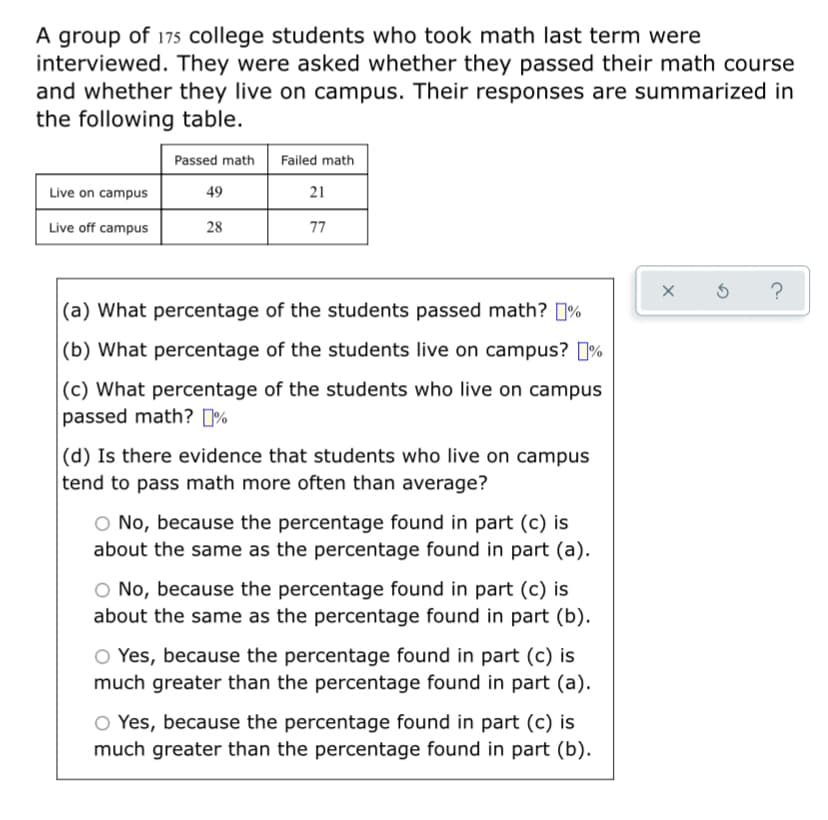A group of 175 college students who took math last term were interviewed. They were asked whether they passed their math course and whether they live on campus. Their responses are summarized in the following table. Passed math Failed math Live on campus 49 21 Live off campus 28 77 ? |(a) What percentage of the students passed math? 1% |(b) What percentage of the students live on campus? % |(c) What percentage of the students who live on campus passed math? [% |(d) Is there evidence that students who live on campus tend to pass math more often than average? O No, because the percentage found in part (c) is about the same as the percentage found in part (a). O No, because the percentage found in part (c) is about the same as the percentage found in part (b). O Yes, because the percentage found in part (c) is much greater than the percentage found in part (a). O Yes, because the percentage found in part (c) is much greater than the percentage found in part (b).
A group of 175 college students who took math last term were interviewed. They were asked whether they passed their math course and whether they live on campus. Their responses are summarized in the following table. Passed math Failed math Live on campus 49 21 Live off campus 28 77 ? |(a) What percentage of the students passed math? 1% |(b) What percentage of the students live on campus? % |(c) What percentage of the students who live on campus passed math? [% |(d) Is there evidence that students who live on campus tend to pass math more often than average? O No, because the percentage found in part (c) is about the same as the percentage found in part (a). O No, because the percentage found in part (c) is about the same as the percentage found in part (b). O Yes, because the percentage found in part (c) is much greater than the percentage found in part (a). O Yes, because the percentage found in part (c) is much greater than the percentage found in part (b).
Chapter9: Sequences, Probability And Counting Theory
Section: Chapter Questions
Problem 56RE: For the following exercises, use the following data: An elementary school survey found that 350 of...
Related questions
Question

Transcribed Image Text:A group of 175 college students who took math last term were
interviewed. They were asked whether they passed their math course
and whether they live on campus. Their responses are summarized in
the following table.
Passed math
Failed math
Live on campus
49
21
Live off campus
28
77
?
|(a) What percentage of the students passed math? 1%
|(b) What percentage of the students live on campus? %
|(c) What percentage of the students who live on campus
passed math? [%
|(d) Is there evidence that students who live on campus
tend to pass math more often than average?
O No, because the percentage found in part (c) is
about the same as the percentage found in part (a).
O No, because the percentage found in part (c) is
about the same as the percentage found in part (b).
O Yes, because the percentage found in part (c) is
much greater than the percentage found in part (a).
O Yes, because the percentage found in part (c) is
much greater than the percentage found in part (b).
Expert Solution
This question has been solved!
Explore an expertly crafted, step-by-step solution for a thorough understanding of key concepts.
This is a popular solution!
Trending now
This is a popular solution!
Step by step
Solved in 2 steps with 2 images

Recommended textbooks for you


Glencoe Algebra 1, Student Edition, 9780079039897…
Algebra
ISBN:
9780079039897
Author:
Carter
Publisher:
McGraw Hill

Big Ideas Math A Bridge To Success Algebra 1: Stu…
Algebra
ISBN:
9781680331141
Author:
HOUGHTON MIFFLIN HARCOURT
Publisher:
Houghton Mifflin Harcourt


Glencoe Algebra 1, Student Edition, 9780079039897…
Algebra
ISBN:
9780079039897
Author:
Carter
Publisher:
McGraw Hill

Big Ideas Math A Bridge To Success Algebra 1: Stu…
Algebra
ISBN:
9781680331141
Author:
HOUGHTON MIFFLIN HARCOURT
Publisher:
Houghton Mifflin Harcourt

Holt Mcdougal Larson Pre-algebra: Student Edition…
Algebra
ISBN:
9780547587776
Author:
HOLT MCDOUGAL
Publisher:
HOLT MCDOUGAL